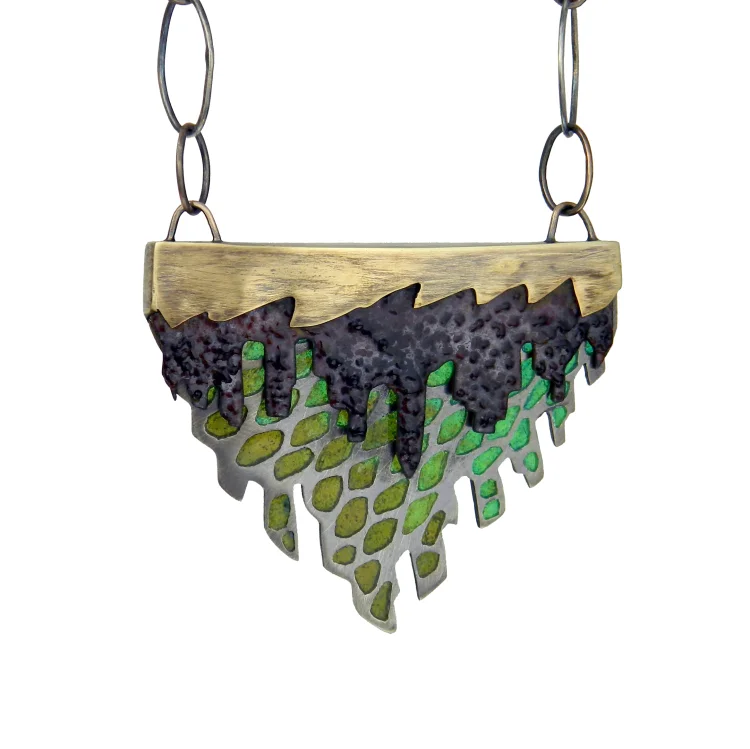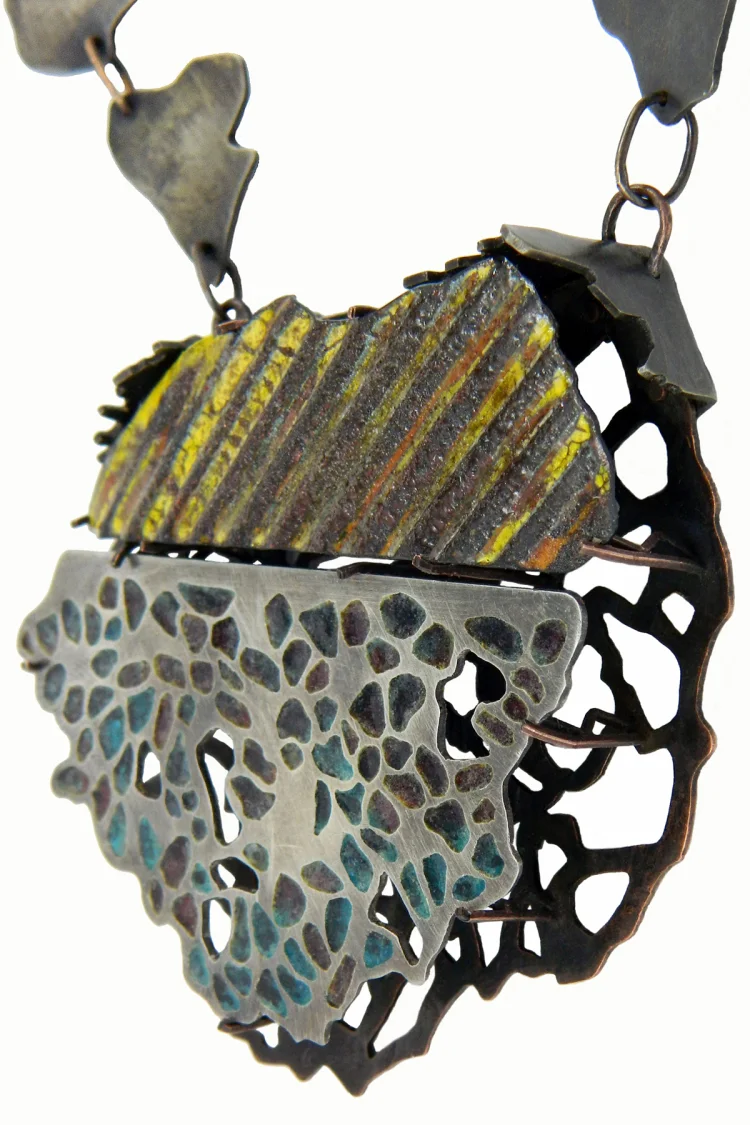Sarah Loch-Test received her BFA in Jewelry/Metals/Enameling from Kent State in 2007. She is now in her third year at East Carolina University working toward her MFA in Metals Design.
Tell us about your work.
I work with metals and enamels, typically making jewelry. One of my favorite techniques is Plique-a-Jour, and I like to layer colors and textures using enamels. I’m currently working on my MFA thesis and am using images I’ve gathered of industrial sites, combining them with elements of their surrounding communities and environments. I’m considering how local identity is tied to these sites, which are no longer used for their intended function and are left in states of disrepair or are appropriated for new purposes.
What were the major reasons you decided to attend an MFA program?
From the time I completed my undergraduate degree, I knew that getting an MFA was something I wanted to do. Grad school offered me a way to build upon skills and experiences I had in the “real world” while focusing on expanding my body of work. Immediately prior to starting grad school, I was the Studio Apprentice at Pittsburgh’s Society of Contemporary Craft where I was introduced to many artists and had the opportunity to teach and work with the community. In order to continue doing that kind of work, I wanted to further my education.
What were the major factors that led you to choose the MFA program you’re currently attending?
The East Carolina University Metals Design program was one I had my eye on for a while. I use so much enameling in my work that it was important to me to continue my education at an institution that understands and supports that medium. Through my work and activities outside of school, I developed relationships with several ECU alumni – they seemed to be everywhere! The alumni hold a range of careers and are so friendly and helpful. That solidified my interest to attend this school.
What is your best piece of advice for applicants when choosing a program?
For those looking at programs, consider more than just the faculty and facilities, although those are important, too! Does the school support travel or research activities? Are there auxiliary workshops, conferences, exhibitions or other activities the program will give you access to? My best memories of grad school have come out of collaborative workshops and symposiums.
Describe a typical day in your life as an MFA student.
I usually get up “early-ish” and get my butt to school. Even if it’s a day without classes or meetings, I think it’s important to be around. Being present in the studio reinforces a productive mindset.
My class schedule is a little different every semester. I try to work, even on little things, in between classes and meetings. The most challenging thing is allowing myself enough time before the Design class I teach to prepare for what I’m doing with the students that day. My evenings consist of my “recess” time at the gym and then heading back to the studio to get more work in.
What do you enjoy most about being an MFA student? What is your greatest struggle?
I’ve enjoyed and struggled with the freedom being a student again has given me. We are given freedom to explore in what and how we make, which is really important. Getting into a routine can be difficult, but I know I need it. Teaching a foundations Design class has been a challenge with balancing the responsibility I have to my students and the desire to just be in my studio.
What is your best piece of financial advice for potential and/or current MFA students?
Don’t let finances get you mentally bogged down; it’s not productive and will ultimately cost you more. If for some reason you do need extra income, choose a part-time job wisely. Try to do something you will be proud to put on your resume instead of working for a fast food chain. Or, research production strategies and take that information to the studio so that you can make some extra cash at holiday sales. Take advantage of those student discounts – this could mean anything from a good deal at the Indian lunch buffet down the street to a significant discount on conference fees.
What are your career plans following grad school? How do you feel your degree has helped facilitate your plans?
I am so open to my future career. I enjoy doing a range of things – from teaching to arts administration. I know I need to be able to get out of my studio and interact with other artists, students or the general public in some capacity; it helps me relate to people and maintain communication skills. I work better in the studio if I have time away.
The span of my experience at ECU will certainly come into play with whatever I end up doing. I’m currently teaching my third semester of Design, and have enjoyed working collaboratively as a co-chair for our annual Symposium.
Is there anything else you’d like to add to assist prospective and current MFA students?
If you’re thinking about continuing your education, make lists: What are your immediate goals and goals five years from now? What equipment do you need access to or what skills do you want to learn? What do you need from faculty or mentors at an institution?
Current students, you should hang out with grad students in other concentrations and talk about your work. They’ll offer a fresh perspective and be a support system. Listen to your brain and your body and treat them like your most valuable tools. This means different things for everyone, but can help you economize your time and go for the long haul. Stop smoking, or get into the habit of wearing a dust mask or other protection. Feed your brain quality information that will infiltrate your writing. Know when to take a walk, get some ice cream, or go back to your research or to whatever feeds your work. If I'm just staring into space or spinning in circles I know I need to do one of these things to reset!
Sarah’s Work:
City Greenery, silver, copper, brass, enamel, 3” x 3” x .5”, 2015 (photo by artist)
City Water Necklace, silver, copper, brass, nickel, enamel, 3” x 3” x 1”, 2014 (photo by artist)
Construction Brooch, copper, brass, enamel, 4” x 2” x 3”, 2015 (photo by artist)



